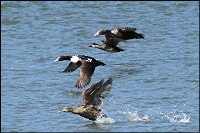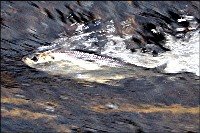Common Goldeneye Returns
.jpg)
Can you see its golden eye? This fish-eating duck species, a Common Goldeneye, is usually the first migrant duck I see each spring in our area.  I have a special place where I look for them and had been checking each day recently. Last week there was just a small area of open water at the stream where I usually find them, but when we returned to check on Saturday we were rewarded with the sight of a pair of Common Goldeneye and a pair of Hooded Mergansers in a free flowing, much greater open area of the same frozen location seen just a few days earlier.
I have a special place where I look for them and had been checking each day recently. Last week there was just a small area of open water at the stream where I usually find them, but when we returned to check on Saturday we were rewarded with the sight of a pair of Common Goldeneye and a pair of Hooded Mergansers in a free flowing, much greater open area of the same frozen location seen just a few days earlier.
To the right is the female seen this past Saturday and the photo to the left below, taken a previous year, shows both a male and female. The female lacks the distinctive round white spot of the male, and her head is brown,

















4 comments:
They certainly are lovely ducks! That black and white is very striking, but she is pretty, too with her brown head. The cheek patch is interesting...so round and white. Makes you wonder at its purpose.
I enjoyed your wonderful post. Ducks have such beautiful patterns in their feathers - to see them is like being at an art gallery. I love your landscape photo as well. Nice that you were able to find the Goldeneye.
:)
They are so beautiful. I've only seen one Goldeneye in my life, when I was in New Hampshire. Your pictures are fantastic.
mary:
Good question about the white circled dot...now you have me wondering too.
april:
I find ducks fascinating and it is difficult at this time of year to wait for the ice to go out of the rivers and for the ducks to return.
sandpiper:
So glad then that I can show you something that is unusual for you not often being viewed in your area.
Thank you all for your comments.
Post a Comment